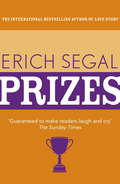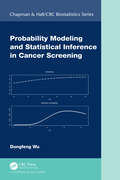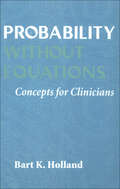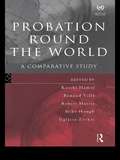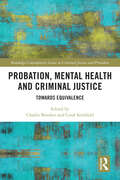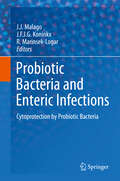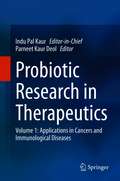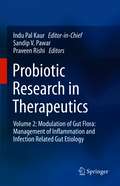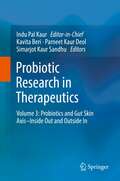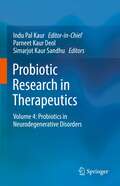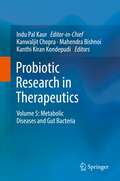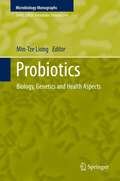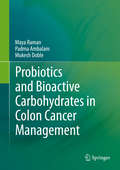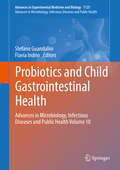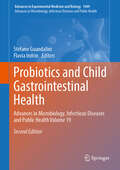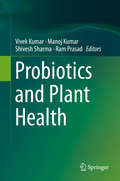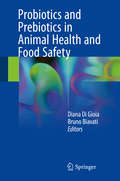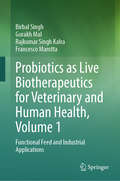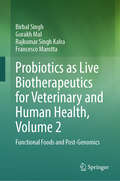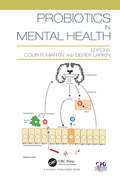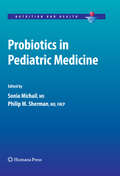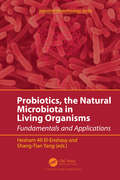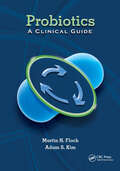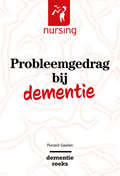- Table View
- List View
Prizes
by Erich SegalIn the arena of life and death, the world's most brilliant doctors and scientists vie desperately - and ruthlessly - for the ultimate prize: the Nobel.Adam Coopersmith is a gifted and compassionate physician. Trapped in an unhappy marriage, he meets Anya, a Russian émigrée, and falls in love for the first time - only to have his career nearly destroyed.Sandy Raven is a cutting-edge researcher whose devotion is matched only by his genius. Yet as he makes his greatest discovery, he experiences his most profound betrayal. Will he choose to live a lie or abandon his dream to seek new, more worldly prizes?Isabel da Costa. A child prodigy, she owes all her success to her father, but though she becomes a brilliant physicist, she can't capture her lost childhood. Ultimately she is torn between the father and the young man who holds the key to her happiness, until a shocking revelation explodes her world.
Probability Modeling and Statistical Inference in Cancer Screening (Chapman & Hall/CRC Biostatistics Series)
by Dongfeng WuCancer screening has been carried out for six decades – however, there are many unsolved problems: how to estimate key parameters involved in screenings, such as sensitivity, the time duration in the preclinical state (i.e., sojourn time), and time duration in the disease-free state; how to estimate the distribution of lead time, the diagnosis time advanced by screening; how to evaluate the long-term outcomes of screening, including the probability of overdiagnosis among the screen-detected; when to schedule the first exam based on one’s current age and risk tolerance; and when to schedule the upcoming exam based on one’s screening history, age, and risk tolerance. These problems need proper probability models and statistical methods in order to be dealt with. Features: This book gives a concise account of the analysis of cancer screening data, using probability models and statistical methods. Real data sets are provided so that cancer researchers and statisticians can apply the methods in the learning process. It develops statistical methods in the commonly used disease progressive model. It provides solutions to practical problems and introduces open problems. It provides a framework for the most recent developments based on the author’s research. The book is primarily aimed at researchers and practitioners from biostatistics and cancer research. Readers should have the prerequisite knowledge of calculus, probability, and statistical inference. The book could be used as a one-semester textbook on the topic of cancer screening methodology for a graduate-level course.
Probability without Equations: Concepts for Clinicians
by Bart K. HollandAn award-winning teacher gives a non-technical explanation of the probability and statistics needed by physicians to interpret laboratory results.Although few physicians, nurses, dentists, and other health professionals perform laboratory tests themselves, they all need to be able to interpret the results as well as understand findings reported in the medical literature. A general understanding of probability and statistics is essential for those needing to make daily decisions about the significance of research data, drug interaction precautions, or a patient's positive laboratory test for a rare disease.Written with these needs in mind, Probability without Equations offers a thorough explanation of the subject without overwhelming the reader with equations and footnotes. Award-winning teacher Bart Holland presents a nontechnical treatment of intuitive concepts and presents numerous examples from medical research and practice. In plain language, this book explains the topics that clinicians need to understand:• Analysis of variance• "P-values" and the "t-test"• Hazard models• Regression and correlations• Alpha and beta errors"The Nobel prize-winning physicist Ernest Rutherford was fond of saying that if you need statistics to analyze the results of an experiment, you don't have a very good experiment. In a way he was right. However, a recurrent problem in medicine is that in a certain sense you commonly don't have a good experiment—but not because medical research scientists are generally incompetent! The nature of the data they work with is simply not as predictable as the data in some other fields, so the predictive nature of findings in medical science is generally rather imperfect."—from the introduction
Probably Approximately Correct: Nature's Algorithms for Learning and Prospering in a Complex World
by Leslie ValiantWe have effective theories for very few things. Gravity is one, electromagnetism another. But for most thingsOCowhether as mundane as finding a mate or as major as managing an economyOCoour theories are lousy or nonexistent. Fortunately, we donOCOt need them, any more than a fish needs a theory of water to swim; weOCOre able to muddle through. But how do we do it? In "Probably Approximately Correct," computer scientist Leslie Valiant presents a theory of the theoryless. The key is OC probably approximately correctOCO learning, ValiantOCOs model of how anything can act without needing to understand what is going on. The study of probably approximately correct algorithms reveals the shared computational nature of evolution and cognition, indicates how computers might possess authentic intelligence, and shows why hacking a problem can be far more effective than developing a theory to explain it. After all, finding a mate is a lot more satisfying than finding a theory of mating. Offering an elegant, powerful model that encompasses all of lifeOCOs complexity, "Probably Approximately Correct" will revolutionize the way we look at the universeOCOs greatest mysteries.
Probation Round the World
by Robert Harris Mike Hough Koichi Hamai Renaud Villé Ugljesa ZvekicWhilst they retain a recognisable common core, probation systems round the world are enormously varied, and many are in a state of rapid change. Probation Round the World is a study of probation in ten countries, ranging from the well-resourced and heavily professionalised services of Britain and the old Commonwealth to the reliance on lay-supervisors in Japan and the community-based system which has recently been set up in Papua new Guinea. Probation Round the World resulted from collaborative research conducted by the United Nations Interregional Crime and Justice Research Institute (UNICRI) and the British Home Office. The first part of the book comprises a review of the development and convergence of probation within the Civil Law and Common Law traditions. The second part describes the origins and functions of systems in the ten countries, drawing out salient differences and similarities. It will provide invaluable reading for students of criminal justice and criminology and for professionals working in probation managment and government.
Probation, Mental Health and Criminal Justice: Towards Equivalence (Routledge Contemporary Issues in Criminal Justice and Procedure)
by Charlie Brooker and Coral SirdifieldThis collection of research and evaluation explores issues in mental health and probation across the globe. The volume offers insight into a wide range of interrelated topics that address the mental health and mental health needs of those under probation supervision. The chapters embrace a range of diverse mental health concerns. The underpinning assumption is that offenders should receive mental healthcare that is ‘equivalent’ to that received by the general population where this is appropriate. This overview is informed by perspectives from academics and practitioners based in England and the Republic of Ireland, and also includes the views of people with lived experience of the criminal justice system. Building upon and adding to the existing literature in this field, the book will be a valuable resource for academics and researchers as well as those training to work in, and currently working in, the criminal justice and mental health field, and would also be of interest to those working in related healthcare settings.
Probiotic Bacteria and Enteric Infections
by J.F.J.G. Koninkx R. Marinsek-Logar J. J. MalagoEvery day many people suffer from intestinal diseases. These disorders can result from pathogens like bacteria, fungi, parasites and viruses, but the causes of non-infectious intestinal disorders and colorectal cancers remain to be elucidated. Disturbances to the normal gut flora (the microbiota) are central to the development of many, if not all, of these disorders. Disturbed gut microbiota is a prelude to public health issues like traveller's-, antibiotic- and Clostridium difficile-associated diarrhoea, irritable bowel syndrome, inflammatory bowel disease, and colorectal cancers. This book discusses the way intestinal disorders affect the microbiota, how the disturbed microbiotal balance leads to enteric disorders and the ways to prevent these disorders. Further his book explores the potential of probiotics (live microorganisms that when ingested bring a health benefit) in treating enteric disorders by analysing the probiotic genome through proteomics, metabolomics and functional assays. Discussed is how the ingestion of specific microorganisms repairs the disturbed microbiota and subsequently ameliorates enteric disorders. Finally this book addresses how genetic engineering and biotechnology will contribute to the development of effective and safe designer probiotics.
Probiotic Research in Therapeutics: Volume 1: Applications in Cancers and Immunological Diseases
by Indu Pal KaurThe volume sheds new light on role of gut dysbiosis in cancer and immunological diseases and their clinical manifestations. Contributions in the volume discuss about the gut microbiota as a therapeutic target and the role of probiotics in its management. The volume explores application of probiotics in the treatment of various cancers viz. colorectal, gastric, lung, and breast cancer and immunological diseases. The volume comprises of chapters from expert contributors organized into various important themes which include, introduction, relationship between gut microbiota and disease condition, mechanisms involved, clinical and in vivo status, conclusion and future directions. This is a highly informative and carefully presented book, providing recent and innovative insight for scholars and researchers with an interest in probiotics and its applications in cancer and immunological diseases.
Probiotic Research in Therapeutics: Volume 2: Modulation of Gut Flora: Management of Inflammation and Infection Related Gut Etiology
by Indu Pal KaurIn a normal physiological state, several bacteria are present in the human gut that is essential to maintain the normal to healthy gastrointestinal function. Disturbances in this “normal flora” lead to gut inflammation and infection. This volume explores the potential of probiotics, the healthy bacteria, to manage gut-related diseases including gastrointestinal cancers, ulcerative colitis, H. pylori infections, and diarrhea; vaginosis; oral health; airway inflammation; and atopic dermatitis. The concept of designer probiotics, edible vaccines and future scope of research in the field is also presented. The animal models used for studying the benefits of probiotics in gut inflammation are described for beginners.
Probiotic Research in Therapeutics: Volume 3: Probiotics and Gut Skin Axis–Inside Out and Outside In
by Indu Pal KaurRecent research in science establishes a direct relation between human gut and skin. Several species of live microbes inhabit the human skin and intestines which far outnumbers the mammalian cells in the human body. Research interest of Nextgen scientists is focused on beneficially harnessing this microbial population to address skin disorders like acne, rosacea, eczema, premature aging, and skin cancer which are established to be a result of skin-microbiome dysbiosis. This volume highlights evidence-based endeavours of the scientific community in this sector. Currently there is no concrete literature which gives a detailed vision on the relationship between gut microbiota and skin related disorders. This volume is an attempt to put together available data in the area and demonstrate usefulness of probiotics as a new therapeutic option for management of these skin diseases which currently show poor prognosis, high cost of treatment and compromised quality of life of the patient.
Probiotic Research in Therapeutics: Volume 4: Probiotics in Neurodegenerative Disorders
by Indu Pal KaurHumans have numerous microorganisms residing in the body, especially in the gut, far exceeding the human body's normal mammalian cells. Recent research links the gut microbiome, the population of microorganisms living in the gastrointestinal tract, with brain diseases. This volume explores the concept and possibility of its extension to manage a galaxy of CNS diseases, including Parkinson's, Alzheimer's, Autism spectrum disorders, depression, insomnia, and chronic fatigue syndrome. This volume elaborates about communication channels between gut and brain via the vagus nerve, short-chain fatty acids including omega acids, and other inflammasomes.In contrast to the available books on the topic, this title is more versatile and endeavors to bring together scientific pre-clinical, and clinical claims on the probable psychobiotic implication of probiotic therapy. The book will appeal similar to the general public, students, experienced researchers, and academicians. It is endeavored to address an aspect of probiotic usage beyond gut disorders. We hope that it would be helpful to people studying the human nervous system and related conditions with their treatments.
Probiotic Research in Therapeutics: Volume 5: Metabolic Diseases and Gut Bacteria
by Indu Pal KaurThis volume focuses on the potential use of probiotics in treating metabolic disorders such as diabetes mellitus, metabolic acidosis, and gut dysbiosis. Chapters draw an association between gut microbiota and its diversity with metabolic diseases like diabetes, obesity, related liver and gut disorders; gut-brain axis; increased inflammation, and a compromised immune system resulting from these manifestations and scope of intervention with probiotics. Special attention is laid on describing the mechanisms of action of such beneficial effects of probiotic administration. The ability of probiotics to decrease metabolic endotoxemia by restoring the disrupted intestinal mucosal barrier is also included.The volume is a comprehensive compilation describing the scope and application of probiotic and prebiotic therapy in treating metabolic disorders. Readers will discover how probiotics are not just confined to the microbiology industry but are showing promising results in the medical and pharmaceutical sectors.
Probiotics
by Min-Tze LiongProbiotic microorganisms have a long history of use, and their health benefits for hosts are well documented. This Microbiology Monographs volume provides an overview of the current knowledge and applications of probiotics. Reviews cover the biology and probiotic potential of the thoroughly studied prokaryotic genera Lactobacillus and Bifidobacterium, several eukaryotic microorganisms, probiotic strain characterization, and the analytical methods (such as FISH, microarray, and high throughput sequencing) required for their study. Further chapters describe the positive effects of probiotics on malabsorption disorders such as diarrhea and lactose intolerance, and document the clinical evidence of benefits in treating allergies and lung emphysema, and in dermatological applications. Also addresses are topics such as genetically engineered strains, new carriers for probiotics, protection techniques, challenges of health claims, safety aspects, and future market trends.
Probiotics and Bioactive Carbohydrates in Colon Cancer Management
by Mukesh Doble Maya Raman Padma AmbalamThis book describes the dietary habits (such as use of probiotics, synbiotics, prebiotics and dietary fiber) that could modify and reduce the risk of developing colorectal cancer (CRC). The book will be of practical and scientific use to academicians, research scholars, students, health professionals, nutritionists, etc. and could support the cause of preventing CRC by adopting smarter food habits. CRC is the third leading cause of death, in terms of both incidence and mortality, among men and women. Excess consumption of red and processed meat, roasted coffee, etc. have shown an increase in CRC, indicating that compounds formed in food containing free amino acids and sugars interact at elevated temperatures to form mutagens or carcinogens. Standard treatment options for CRC include invasive surgery and chemotherapy or radiation. Several lifestyle and dietary factors could prevent this ailment. Probiotics, prebiotics and synbiotics that are found in functional foods, health supplements and nutraceuticals and short chain fatty acids that are formed in the colon as a result of microbial fermentation of undigested bioactive carbohydrates by Bifidobacterium and Lactobacillus inhibit colonic epithelial cells and minimize inflammation, thereby exhibiting immunomodulatory effects. This book tries to address the novel unexplored benefits and mechanism of action of these functional foods.
Probiotics and Child Gastrointestinal Health: Advances in Microbiology, Infectious Diseases and Public Health Volume 10 (Advances in Experimental Medicine and Biology #1125)
by Stefano Guandalini Flavia IndrioThis book shows the huge impact the gut microbiota has on the gastrointestinal health of humans with a particular focus on children. It also highlights the potential use of probiotic microorganisms to protect or improve children’s gastrointestinal health.Humans are not single organisms: We are a multi-organism structure composed of ourselves and our microbiota, living in close symbiosis since birth and even before. The huge impact that the billons of microscopic cells living in our gut have on our gastrointestinal and systemic health cannot be overestimated. The enormous progress that has been made in the past decade in our still very incomplete understanding of the gut microbiota is opening the door to potential applications in human health that were simply unthinkable before.One of the most interesting aspects of this new scientific horizon is the fact that we may identify (or even create in the laboratory) and utilize many of these “friendly bacteria” to protect, or improve our health. Thus, strains of probiotic microorganisms are being identified and studied in a vast array of clinical scenarios. Among the most investigated areas for probiotics is the gastrointestinal health of children.The topics addressed in this book are spanning from the development of the gut microbiota in the fetus and newborn all the way to current and potential applications in disparate conditions such as necrotizing enterocolitis, or infectious, or inflammatory conditions affecting the child. The book is written in a rigorous, evidence based manner by an international group of outstanding experts in these fields and is aimed at pediatric gastroenterologists, pediatricians and physician scientists alike.
Probiotics and Child Gastrointestinal Health: Advances in Microbiology, Infectious Diseases and Public Health Volume 19 (Advances in Experimental Medicine and Biology #1449)
by Stefano Guandalini Flavia IndrioThis fully updated second edition demonstrates the major impact that the gut microbiota has on human gastrointestinal health, with a special focus on children. The book also explores the potential use of probiotic microorganisms to protect or improve gastrointestinal health in children. Humans are not a single organism: We are a multi-organic structure composed of ourselves and our microbiota, living in close symbiosis since birth and even before. The enormous impact that the billions of microscopic cells in our gut have on our gastrointestinal and systemic health cannot be overstated. The tremendous progress that has been made in the last decade in our still very incomplete understanding of the gut microbiota opens the door to potential applications in human health that were simply unthinkable before. One of the most interesting aspects of this new scientific horizon is the fact that we can identify (or even create in the lab) many of these "friendly bacteria" and use themto protect or improve our health. Thus, strains of probiotic microorganisms are being identified and studied in a variety of clinical scenarios. One of the most studied areas for probiotics is pediatric gastrointestinal health. Topics covered in this book range from the development of the intestinal microbiota in the fetus and neonate to current and potential applications in various conditions such as necrotizing enterocolitis or infectious or inflammatory diseases of the child. Written by an international group of preeminent experts in these fields in a rigorous, evidence-based manner, the book is intended for pediatric gastroenterologists, pediatricians, and medical scientists alike.
Probiotics and Plant Health
by Manoj Kumar Ram Prasad Vivek Kumar Shivesh SharmaThis book primarily focuses on microbial colonization, its role in plant growth and nutrient cycling, mycorrhizae, and providing an overview of phytospheric microorganisms in sustainable crop systems. Despite the advances made in the study of plant-microbe synergism, the relation between microbes and plant health in the context of food security, soil nutrient management, human and plant health is still largely unexplored. Addressing that gap, the book presents reviews and original research articles that highlight the latest discoveries in plant probiotics, their specificity, diversity and function. Additional sections addressing nutrient management, human health, and plant microbiome management to improve plant productivity round out the coverage.
Probiotics and Prebiotics in Animal Health and Food Safety
by Diana Di Gioia Bruno BiavatiThis book discusses the role of probiotics and prebiotics in maintaining the health status of a broad range of animal groups used for food production. It also highlights the use of beneficial microorganisms as protective agents in animal derived foods. The book provides essential information on the characterization and definition of probiotics on the basis of recently released guidelines and reflecting the latest trends in bacterial taxonomy. Last but not least, it discusses the concept of “dead” probiotics and their benefits to animal health in detail. The book will benefit all professors, students, researchers and practitioners in academia and industry whose work involves biotechnology, veterinary sciences or food production.
Probiotics as Live Biotherapeutics for Veterinary and Human Health, Volume 1: Functional Feed and Industrial Applications
by Birbal Singh Gorakh Mal Francesco Marotta Rajkumar Singh KalraThis Volume 1 of a two-volume work provides an up-to-date overview of the latest advances in live biotherapeutics research. It focuses on key areas within probiotics and microbiome studies from the veterinary sciences including their translation into commercial applications. The book is divided into three sections, comprising (I) fundamentals about probiotic resources, (II) probiotics for veterinary health, with chapters on farm animals, pets, wildlife and aquaculture, and (III) industrial applications of probiotics. The broad spectrum of industry-relevant contributions makes this work a valuable resource for industry professionals as well as researchers in functional feed and food biotechnology, applied veterinary microbiology and gastroenterology. Presenting novel and evidence-based research, this volume will drive the commercial enterprise and meets the great demand for good probiotic products in the veterinary medical sector.
Probiotics as Live Biotherapeutics for Veterinary and Human Health, Volume 2: Functional Foods and Post-Genomics
by Birbal Singh Gorakh Mal Francesco Marotta Rajkumar Singh KalraThis Volume 2 of a two-volume work provides an up-to-date overview of the latest advances in live biotherapeutics research, engineered and genome-edited probiotics. It focuses on key areas within probiotics and microbiome studies in human medicine, including their translation into commercial applications. The book is divided into three sections, comprising (I) biomedical and nutritional benefits of probiotics for human health, (II) post-genomic technologies in probiotics sciences and genome engineering, and (III) biosafety aspects and prospects of biotherapeutics. The broad spectrum of industry-relevant contributions makes this work a valuable resource for industry professionals as well as researchers in functional food and feed biotechnology, applied microbiology and gastroenterology. Presenting novel and evidence-based research, this volume will drive the commercial enterprise and meets the great demand for good probiotic products in the human medical sector.
Probiotics in Mental Health
by Colin R. Martin Derek LarkinThe concept that the gut and brain are intricately linked is widely accepted not just within the lay community but increasingly within scientific and therapeutic circles as well. Terms such as "heartache" and "gut wrenching" are more than mere metaphor, they represent key fundamental aspects of human experience which all individuals will invariably endure from time to time. The relationship between the gut and brain is complex but fundamental to health and wellbeing. Increasing and compelling evidence supports the existence of a relationship between the health and status of the gut and the manifestation of significant psychopathology. Uniquely within the field of mental health and psychiatry, the role of gut flora and probiotics in both the understanding and treatment of mental illness represents an emerging science whether the potential for therapeutic intervention, through the use of probiotics, offers an opportunity to determine efficacy within a coherent evidence-based model of both action and pathology or, moreover, offers interventions that are comparatively benign compared to the side-effect profile associated with most drugs used to treat mental illness. <P><P>Probiotics in Mental Health examines the role of probiotics in a range of clinical presentations associated with significant psychopathology and facilitates a reconsideration of how mental illness may be conceptualised within a coherent gut-brain model of health and wellbeing. Under the rubric of enhancing wellbeing rather than dwelling on illness and disease, this exciting new volume not only comprises the latest evidence in the field but also advocates an approach characterised by the understanding of mental disorder within an evidence-based model and the pursuit of mental health and wellbeing through the most benign of interventions.
Probiotics in Pediatric Medicine
by Sonia Michail Philip M. ShermanProbiotics in Pediatric Medicine provides clinicians a tool to understand the current evidence for the role of probiotics in various pediatric disorders related to the gastrointestinal as well as the extra-intestinal tract. This book provides evidence-based up-to-date information from world experts in their fields to help clinicians make decisions regarding the use of probiotics. A list of resources, web sites, and references relevant to probiotics can be found in the appendix. Currently, the market for probiotics continues to rely heavily on health claims made by manufacturers and retailers. Clinicians have the sole responsibility to understand the various strains and preparations commercially available and to advise patients accordingly. Probiotics in Pediatric Medicine is an indispensable tool and a critical resource for health professionals that will aid in enhancing their ability to make the appropriate decisions regarding the use of probiotics.
Probiotics, the Natural Microbiota in Living Organisms: Fundamentals and Applications (Industrial Biotechnology)
by Shang-Tian Yang Hesham Ali El-EnshasyBeneficial microbes called probiotics exist naturally in our bodies and play a vital role in our health. Probiotics have been known to produce important microbiota of antimicrobial compounds that enhance our immunity to counter the harmful effects of pathogenic organisms. These microbes are also used in the treatment of diseases and in negating the side effects of chemically synthesized medicines. The study of probiotic organisms and their wide applications in industrial products for human and animal uses has thus gained momentum. This book provides a comprehensive review on the research and applications of probiotics. It serves as a reference and resource for undergraduate and postgraduate students, researchers, companies, and policy makers who are active in fields related to functional food and feed, industrial biotechnology, nutraceuticals, and medicine. All chapters in this book have been written and edited by leading experts in the respective fields from academia, industry, or government.
Probiotics: A Clinical Guide
by Martin Floch Adam KimProbiotics: A Clinical Guide is one of the first books on the market to present current and evidence-based recommendations for primary care providers and gastroenterologists on the use of probiotics as a way to treat specific diseases and disorders.Why you will want Probiotics: A Clinical Guide: Unique focus on the clinical use of probiotics in a wide variety of diseases Comprehensive review of the science behind probiotics and probiotic products In-depth review of current literature for specific diseases or disorders Recommendations of the use of probiotics is supported by evidence-based clinical trials Each chapter includes a table that outlines the exact probiotic organisms and dosages that are the most efficacious A glance at what is inside Probiotics: A Clinical Guide: Basic Physiology Intestinal microecology; stimulating the immune response, nutrients to nourish the organism, role in fermentation and metabolism, and much more… Use in Clinical Medicine Probiotics in children, adult infectious diarrhea, surgical infections, allergic disease, ulcerative colitis, crohn’s disease, liver disease, and more… Probiotics: A Clinical Guide by Dr. Martin Floch & Dr. Adam Kim is a ground-breaking book that will serve as a valuable reference and clinical guide for gastroenterologists, internists, family practitioners, nurse practitioners, and physician assistants.
Probleemgedrag bij dementie (Nursing-Dementiereeks)
by Ronald GeelenDit boek geeft verzorgenden, verpleegkundigen en gedragskundigen kennis en praktische adviezen over probleemgedrag bij dementie. De visies op probleemgedrag komen aan bod. Je krijgt de aandachtspunten voor het stap-voor-stap analyseren en gedragsadviezen voor het omgaan met probleemgedrag. De vertrekpunten worden geïllustreerd met heel uiteenlopende en sprekende casuïstiek. Probleemgedrag bij dementie komt veel voor in allerlei gedaantes. Het gaat dan niet alleen over bijvoorbeeld agressie en claimend gedrag, maar ook spanningen, onrustig gedrag, depressieve en angstige gevoelens bij deze kwetsbare doelgroep. Het vóórkomen van dergelijk gedrag is eerder regel dan uitzondering bij dementie. Maar hoe moet je daarnaar nu kijken en hoe kun je ermee omgaan? Ronald Geelen werkt als psycholoog bij Thebe te Breda, is auteur van verschillende artikelen en boeken, waaronder Familie begeleiden bij dementie en Dementiezorg in de praktijk – deel 1 & 2. Hij werkt daarnaast voor het Centrum voor Consultatie en Expertise (CCE).
